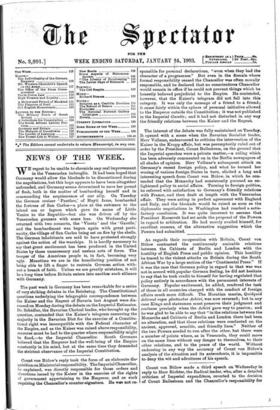Count von Billow's reply took the form of an elaborate
dis- quisition on Ministerial responsibility. The Imperial Chancellor, he explained, was directly responsible for those orders and directions issued by the Kaiser in the exercise of the rights of government appertaining to the Emperor, and as such requiring the Chancellor's counter-signature. He wets not re- sponsible for personal declarations, "even when they had the character of a programme." But even in the domain where formal responsibility ceased the Chancellor was often morally responsible, and he declared that no conscientious Chancellor would remain in office if he could not prevent things which he honestly believed prejudicial to the Empire. He contended, however, that the Kaiser's telegram did not fall into this category. It was only the message of a friend to a friend; it came fairly within the sphere of personal initiative allowed to the Emperor outside the Constitution; it was not published in the Imperial Gazette; and it had not disturbed in any way the friendly relations between the Kaiser and the Regent.






































